Herman von Hebel's hybrid integrity
Herman von Hebel, the chairperson of the independent Commission for the evaluation of the integrity of candidates for the position of member in the self-administration bodies of judges and prosecutors - the Pre-Vetting Commission, worked from March 8, 2013 to April 16, 2018, as a Registrar at the International Criminal Court (ICC) from The Hague. The Dutch media wrote, in 2018, that the administrative activity of Herman von Hebel would have been affected by illegalities and would have caused damage to the International Criminal Court in the amount of at least 760,000 euros. Several decisions, deemed to be illegal, were taken in connection with a reform initiated by Herman von Hebel at the Court, later harshly criticized by the judges. The High Court incurred costs of 7 million euros for the reform, and the judges of the Court accused von Hebel of hidden intentions. "If I could collect the knives put in my back over those reforms, I could open a restaurant," was Herman's response to criticism of the reform which were initiated by him.
March 13, 2018. Herman von Hebel, who 5 years later would become chairperson of the Pre-Vetting Commission in the Republic of Moldova, which verifies the integrity of magistrates, withdraws candidacy for a new five-year mandate as Registrar of the Hague-based ICC.
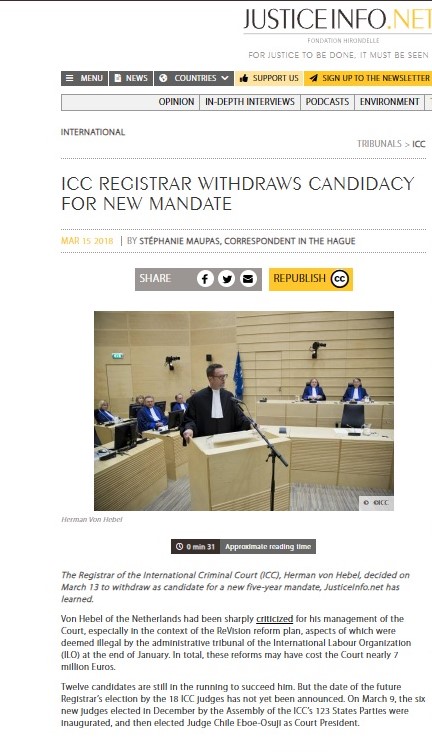
The withdrawal of the Registrar from the race is determined by illegalities admitted in the context of a reform, writes the Dutch media. "Von Hebel of the Netherlands had been sharply criticized for his management of the Court, especially in the context of the ReVision reform plan, aspects of which were deemed illegal by the International Labor Organization (ILO) administrative tribunal...", wrote the legal publication www.justiceinfo.net, in an article published on March 15, 2018.
It happened in the midst of a scandal in which the Hague Court had been harshly criticized for maladministration, resulting in the harming of several people due to illegalities, admitted to the implementation of a reform plan, called ReVision, initiated by Herman von Hebel while he managed the Court Registry between 2013-2018. The Hague Court Registry is the administrative body, which manages the entire administration, with finances and employees, apart from the judges.
The International Criminal Court in The Hague-based ICC is one of the most important permanent international courts worldwide. The Hague-based court is composed of 18 judges and is meant to try criminals who have committed genocide against their own people, war crimes, crimes of aggression and crimes against humanity. The Court was established by the Rome Statute of 17 July 1998 which entered into force on 1 July 2002.
In 2016, an audit report found that the Registrar Herman von Hebel applied "hybrid options" in the initiated reform of the unsuccessful selection of external experts in parallel with the involvement of some employees of the International Criminal Court under his command.
The rapporteurs wrote that the Registrar's actions contradicted the Court's Rules of Procedure, namely the requirements of Article 44.2 of the Rome Statute, which stipulated the application of "the highest standards of efficiency, competence and integrity".
"International Criminal Court under fire for mismanagement"
The Dutch media wrote, on February 26, 2018, about 6 judgements of the Administrative Court of the International Labor Organization, officially handed down at the end of January 2018. For the judgements which were deemed illegal, of the Registrar von Hebel, the International Criminal Court was obliged by the Administrative Court to pay compensation in the total amount of 660,000 euros and bear in addition at least 100,000 euros as administrative costs of representation in the lawsuits that he lost.
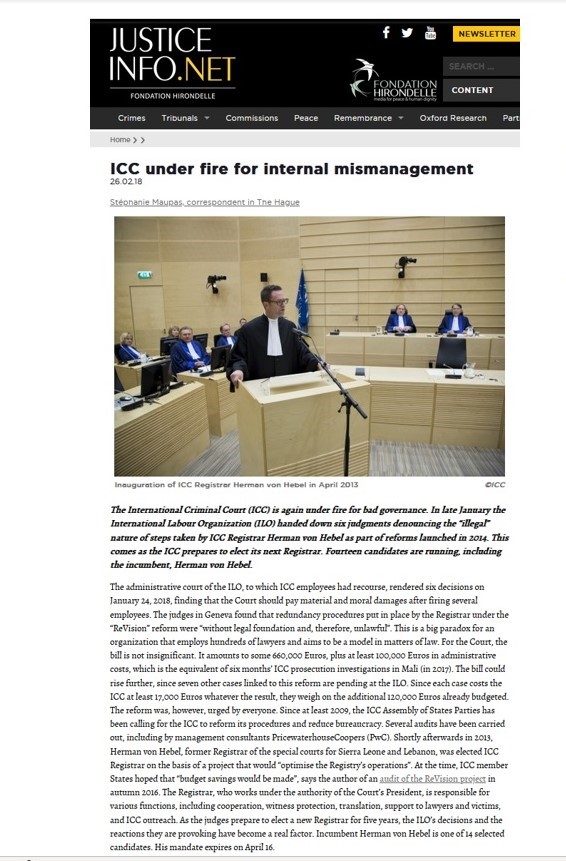
The reporter from The Hague for the JusticeInfo portal, Stephanie Maupas, entitled her article about the activity of Herman von Hebel "ICC under fire for internal mismanagement".
Bill paid by the International Criminal Court
The ILO Administrative Tribunal has annulled a series of illegal acts by Registrar Herman von Hebel, which can be found in judgments 3903-3908, available on the Court's website.
Also, in at least six judgements, the Administrative Court ordered the payment of moral and material compensation to Herman von Hebel's subordinates, whose rights were violated:
1. Judgement no. 3908 of October 30, 2017, publicly handed down on January 24, 2018, by which the complainant received material compensation of 180,000 euros, moral compensation of 40,000 euros and expenses of 2,000 euros. Total: 222,000 euros.
2. Judgement no. 3907 of November 9, 2017, publicly handed down on January 24, 2018, by which the decisions of the Registrar of the International Criminal Court of February 22, 2016 and the decisions of June 17, 2015 were annulled as illegal, and the complainant received material compensation of 220,000 euros, moral damages of 40,000 euros and expenses of 8,000 euros. Total: 268,000 euros.
3. Judgement no. 3906 of November 9, 2017, publicly handed down on January 24, 2018, by which the decision of the Registrar of the International Criminal Court of March 23, 2016 was annulled as illegal, and the complainant received moral damages of 20,000 euros and expenses of 4,000 euros. Total: 24,000 euros.
4. Judgement no. 3905 of November 9, 2017, publicly handed down on January 24, 2018, by which the decision of the Registrar of the International Criminal Court of March 23, 2016 was annulled as illegal, and the complainant received moral damages of 20,000 euros and expenses of 4,000 euros. Total: 24,000 euros.
5. Judgement no. 3904 of November 1, 2017, publicly handed down on January 24, 2018, by which the decision of the Registrar of the International Criminal Court of March 23, 2016 and the decision of June 16, 2015 were annulled as illegal, and the complainant received material compensation of 37,000 euros, moral damages of 20,000 euros and expenses of 4,000 euros. Total: 61,000 euros.
6. Judgement no. 3903 of November 1, 2017, publicly handed down on January 24, 2018, by which the decision of the Registrar of the International Criminal Court of March 23, 2016 and the decision of June 16, 2015 were annulled as illegal, and the complainant received material compensation of 37,000 euros, moral damages of 20,000 euros and expenses of 4,000 euros. Total: 61,000 euros.
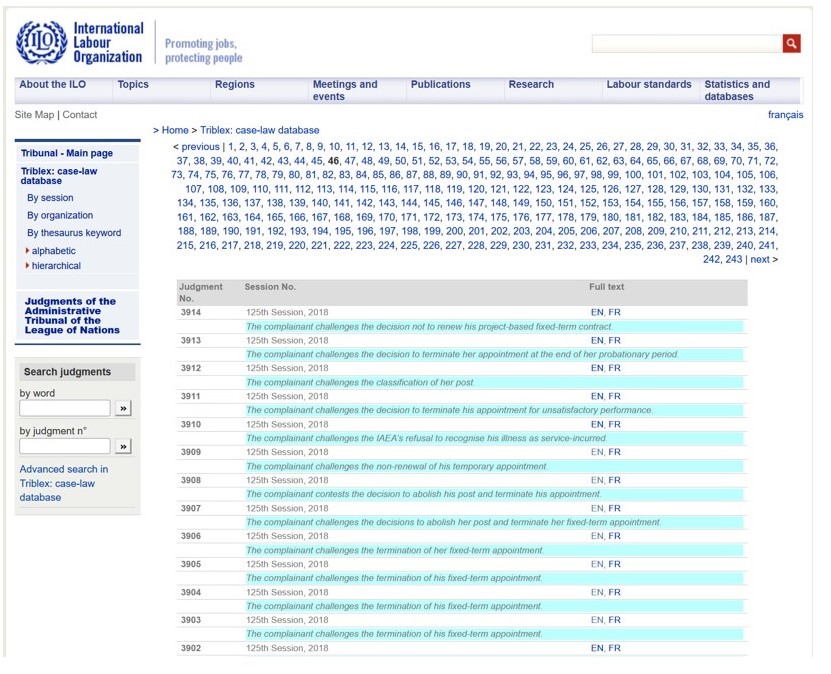
"Hybrid" options
Registrar Herman von Hebel made decisions that harmed several of his subordinates in a project to reform the Registry of the International Criminal Court, called ReVision. Although the idea of reform was mostly welcomed, the implementation was harshly criticized by the judges of the Court, who noted the limitation of the transparency of the activity and expenses of the Court. Some magistrates asked for his resignation.
The international audit carried out on the progress of the project, in order to identify problems and recommendations for improvement, revealed several shortcomings. The audit report was released in November 2016. The report found, among other things, problems with von Hebel's recruitment of experts for that project.
Here are some findings of the report, which I have translated from English: "25. The Registrar opted for a hybrid formula, combining a small number of staff members and three outside individuals, inspired by many examples where advice on the setting up of a system of international justice is sought from external experts. These experts were recruited onto part-time contracts with no prior definition of role profiles, no call for applications and not selection procedure, on grounds of urgency".
"26. Article 44.2 of the Rome Statute stipulates that "The Prosecutor and the Registrar shall ensure the highest standards of efficiency, competency and integrity, and shall have regard, mutatis mutandis, in the criteria set forth in Art. 36 paragraph 8".
"27. Article 4.3 of the Court’s Staff Regulations provides that " selection shall normally be made on a competitive basis", and the ASP resolution of September 12, 2003 (ICC-ASP/2/Res.2)14 stipulates that a selection Board should be used."

Suspicions of the Court judges to the €7 million reform of the Registrar von Hebel
After the findings of the audit about the deficiencies in the training of the project team with which the Registrar von Hebel started the implementation of his ReVision reform plan, the Dutch media wrote, on February 26, 2018, in the same article in which it first wrote about the judgements of the Administrative Court that granted compensation of 660,000 euros, that "at the Court, rumors were rife about the motives of the Registrar, who was accused of wanting to put his people not only in the ReVision team but also in the posts that would arise from the reform. The climate of mistrust was all the greater because after the assessment the ReVision team was to tackle the heart of the project -- rationalizing the Registry. To modify its structure, the team decided to scrap 120 jobs at the Court and create the same number of new ones. The staff concerned were given the choice between being made redundant with compensation or applying for the newly created posts. The 2016 audit report carried out by the French Court of Auditors, stresses that “whilst a dozen people needed to leave the Court because of poor performance, that should have been done otherwise than through ReVision ".
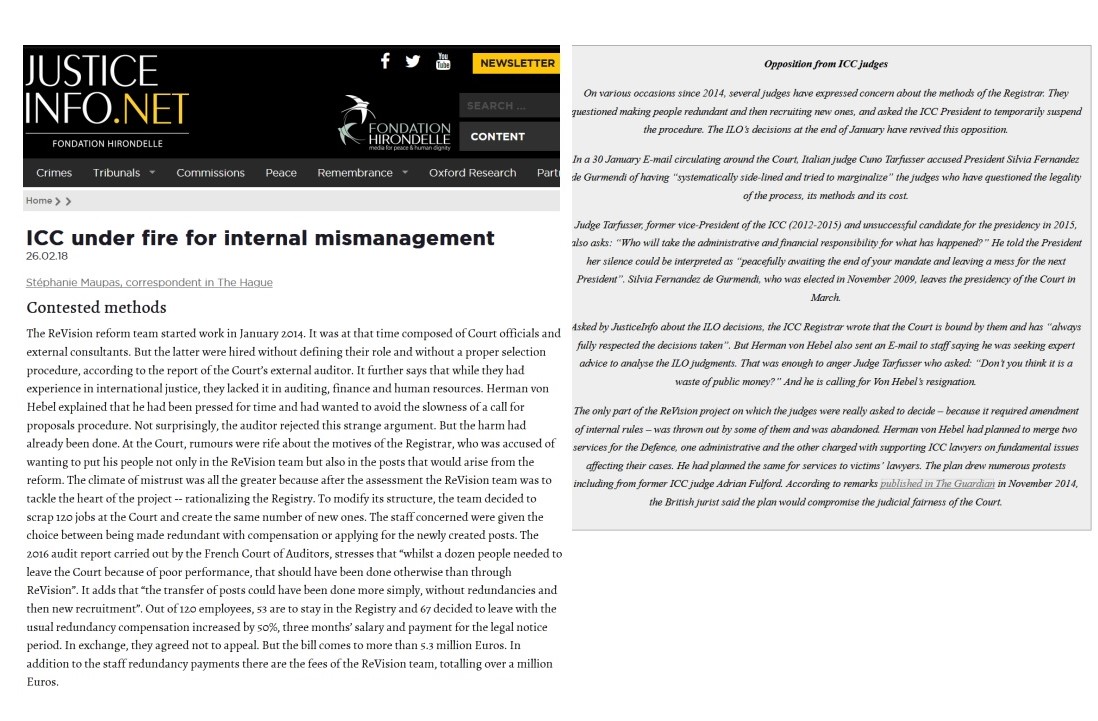
The same source adds that “the transfer of posts could have been done more simply, without redundancies and then new recruitment”. Out of 120 employees, 53 are to stay in the Registry and 67 decided to leave with the usual redundancy compensation increased by 50%, three months’ salary and payment for the legal notice period. In exchange, they agreed not to appeal. But the bill comes to more than 5.3 million Euros. In addition to the staff redundancy payments there are the fees of the ReVision team, totaling over a million Euros.”
Opposition from ICC judges and request for resignation
In the Dutch media, I found that on various occasions, several judges have expressed concern about the methods of Registrar von Hebel. They questioned making people redundant and then recruiting new ones, and asked the ICC President to temporarily suspend the procedure. The ILO’s decisions at the end of January have revived this opposition.
Judge Tarfusser, former vice-President of the ICC (2012-2015) and unsuccessful candidate for the presidency in 2015, also asks: “Who will take the administrative and financial responsibility for what has happened?”
Asked by JusticeInfo about the ILO decisions, the ICC Registrar wrote that the Court is bound by them and has “always fully respected the decisions taken”. But Herman von Hebel also sent an E-mail to staff saying he was seeking expert advice to analyze the ILO judgments. That was enough to anger Judge Tarfusser who asked: “Don’t you think it is a waste of public money?” And he is calling for Von Hebel’s resignation.
"Changes could make court institutionally lopsided!" – warns a judge of the Court of Appeal for England and Wales
The only part of the ReVision project where the judges were actually consulted and asked to decide, as it involved changing the internal regulations, was later set aside by someone among them, and finally abandoned. Herman von Hebel planned to merge two important defense departments: the administrative one and the other responsible for supporting the lawyers of the Court on the fundamental aspects affecting their cases. He planned the same for legal representation services for victims before the Court. And this plan has sparked many protests among judges, including from a former judge of the Court, Sir Adrian Fulford.
Sir Adrian Fulford, who served as a judge of the Court of Appeal for England and Wales, commented for the famous British newspaper The Guardian, in November 2014, the reform started by Herman von Hebel at the International Criminal Court, which contributed to the establishment of the Court and activated from the very beginning. The British judge criticized the reform in harsh terms and said that the plan of the Registrar von Hebel will compromise the judicial fairness of the Court.
The first British judge at the International Criminal Court in The Hague, magistrate Fulford, together with other judges from the first composition of the ICC, laid the foundation for the organization of the Court when they drew up its operating regulations. It was up to Sir Fulford to develop the section on the defense of the interests of defendants and victims of crimes under the jurisdiction of the Court (n.a. genocide, war crimes, aggression and crimes against humanity), he called this system "my brainchild". During a public lecture, the magistrate expressed that "the institution might be lopsided" following the changes proposed by the registrar Herman von Hebel. He expressed concerns that defendants and victims would be left insufficiently represented while very considerable power remained with the prosecutor. These reforms will make the victim's participation in the process practically meaningless, reducing it to a symbolic gesture. The exact formula used by the magistrate is the term "emasculate", meaning "will castrate".

"If I could collect the knives put in my back, I could open a restaurant"
After the departure of Herman von Hebel from the Registry of the International Criminal Court, the American newspaper The New York Times wrote about the Court that it would have become entangled in as many lawsuits as those filed by current and former employees, whose jobs were eliminated or repurposed in a major staff cutback a few years ago. in the major personnel reshuffles of several years ago. External auditors had found that 120 jobs out of 900, should be abolished or changed.
While some people took generous severance packages or received new assignments, and 10 people were dismissed, Herman von Hebel, the Court’s administrator at the time, said that many more were disgruntled and sued. Herman von Hebel, whose tenure ended in April 2018, responded to the critics as follows: "If I could collect the knives put in my back over those reforms, I could open a restaurant."
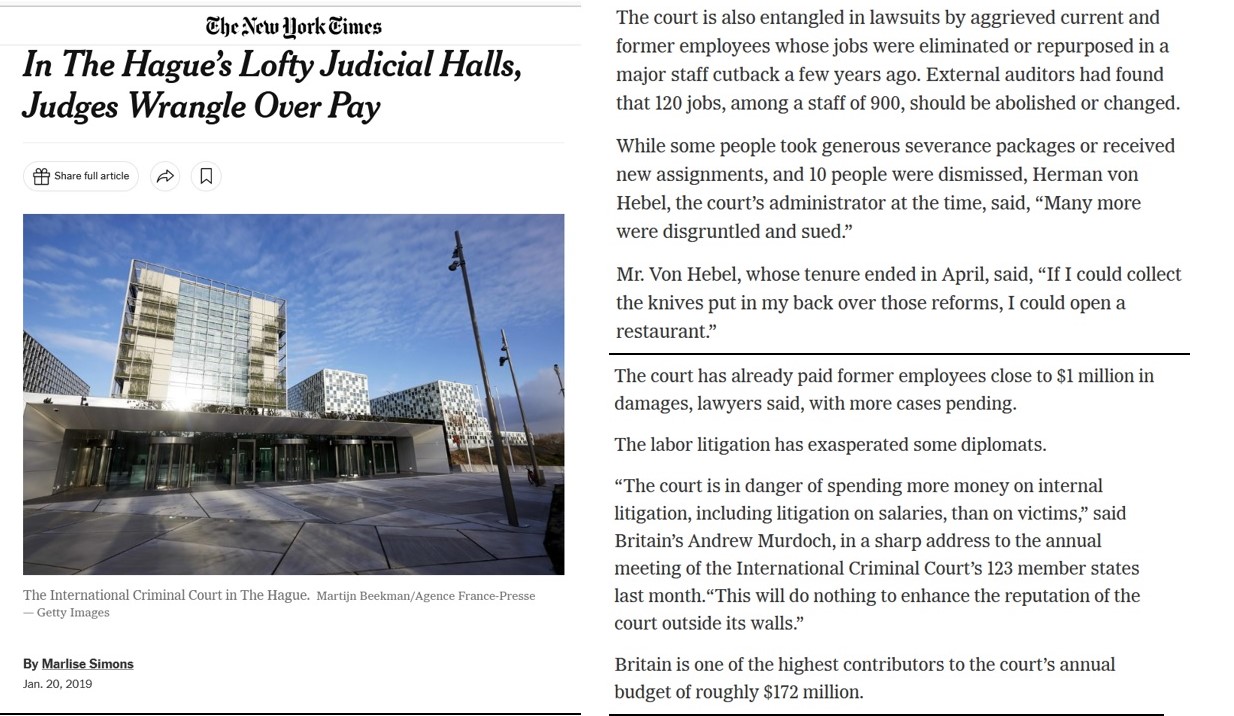
According to lawyers, the Court has already paid former employees close to $1 million in damages with more cases pending. The labor litigation has exasperated some diplomats. "The court is in danger of spending more money on internal litigation, including litigation on salaries, than on victims," said Britain's Andrew Murdoch in the annual meeting of the International Criminal Court's 123 member states in December 2018. "This will do nothing to enhance the reputation of the court outside its walls”, said the diplomat.
Great Britain is one of the highest contributors to the Court's annual budget of roughly $172 million annually.
Biography divergences
I looked for the updated and full CV of Herman von Hebel, but I could not find it on any resource from the Republic of Moldova. There is no biographical information about Herman von Hebel on the website of the Parliament of the Republic of Moldova, but one can find the following information on the website of the Pre-Vetting Commission: " Part-time criminal judge at the Court of Appeal in Den Bosch, Netherlands. Between 2013 and 2018, he was a Registrar at the International Criminal Court (ICC). He has 17 years of accumulated experience in four international criminal courts, 10 years of experience as a legal advisor in the Ministry of Foreign Affairs and the Ministry of Justice of the Netherlands on human rights issues, international humanitarian law and criminal law, he has extensive experience in cooperation with and between international and national judicial systems. He has worked on projects in Albania, Ukraine, Georgia, Indonesia and conflict-affected countries. He developed the road map for the establishment of the High Anti-Corruption Court in Ukraine. He trained court presidents and court managers on effective court management practices and on the development of a Code of Ethics for Judges in Georgia.”
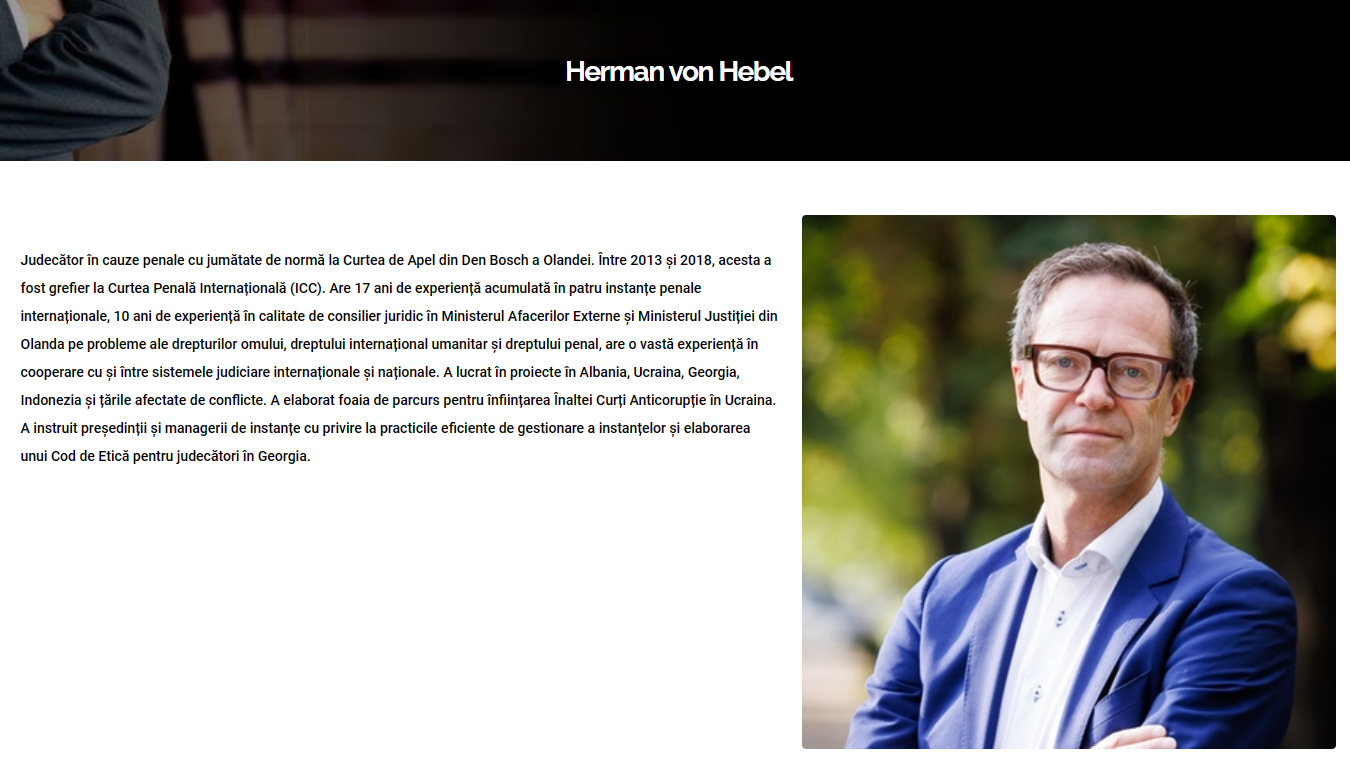
Anticoruptie.md requested the CV through a message addressed to the Pre-Vetting Commission and the Media Service, but it did not receive any reply.
In public, Herman von Hebel's CV can only be found in the ICC archives. It reflects the professional experience until he became a Registrar at the High Court. Contrary to the information on the website of the Pre-Vetting Commission, the CV from the International Criminal Court does not contain the information about his experience as a "part-time criminal judge at the Den Bosch Court of Appeal of Netherlands", just information about his activity as a Registrar or deputy registrar in several international courts - Lebanon (2009-2013), Sierra Leone (2006-2009), Former Yugoslavia (2001-2006), experience as a legal advisor at the Ministry of Foreign Affairs (1991-2000), specialist in legislation at the Ministry of Justice of the Netherlands (1990-1991) and researcher at the University of Utrecht (1987-1989). The only mention of his activity as a judge is that of a university lecturer who participated in student moot court competitions at the university.
I got Herman von Hebel's CV from sources in Parliament. From this CV I learned that Herman von Hebel became a part-time criminal judge at the Court of Appeal in Den Bosch, the Netherlands starting with September 2020 until present, when he applied for the position of member of Moldova’s Pre-Vetting Commission.
The Den Bosch Court of Appeal confirmed for anticorruptie.md information different from that indicated by Herman von Hebel in his CV, namely that he has been a judge at their court since May 2020 and is still working to this day. This would contradict the legal provisions, which do not allow the members of the Pre-Vetting Commission to be simultaneously active in another public office.
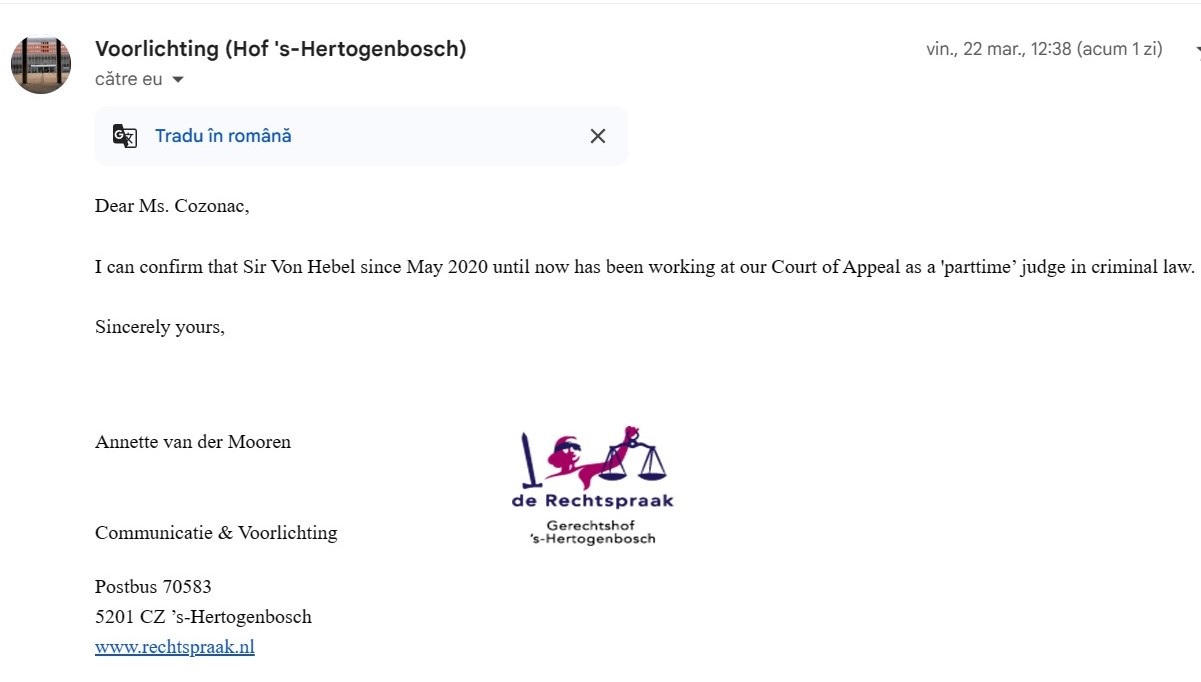
Similarly, the CV presented to the Parliament reveals that Herman von Hebel was project manager, deputy and long-term expert within the EURALIUS V Project in Albania, between October 2019 and November 2020. From the information of the Court of Appeal in Den Bosch of the Netherlands we find out that he became a judge in May 2020, which is 7 months earlier than the date until he is supposed to have continued to work in the EURALIUS V project in Albania under a long-term commitment.
Similarly, from the CV we learn that for a year in Albania, Herman von Hebel was in charge of "supporting the Supreme Court of Albania regarding the development and implementation of strategies for managing the excessive amount of cases, new work methods, IT solutions and legislative changes to ensure the efficient and independent functioning of the judiciary, also in relation to the vetting process implementation of all judges, supporting the Ministry of Justice in the development of strategies to improve the functioning of the judicial system".
We requested the implementer of the EURALIUS V Project, the German Foundation for International Legal Cooperation (IRZ), to inform us how long Herman von Hebel was active in the project and whether his commitment as deputy project leader and long-term expert allowed him to serve as judge in the Netherlands. I did not receive any reply before the investigation was published.
Another biography divergency between the information posted on the website of the Pre-Vetting Commission and Herman von Hebel's CV in the ICC archives concerns his activity within the Ministry of Justice of the Netherlands. On the page of the Pre-Vetting Commission it is indicated that von Hebel was a legal adviser to the "Ministry of Justice of the Netherlands on human rights issued, international humanitarian law and criminal law", while the other CV indicates that when he was working at the Ministry of Justice as a legislative expert, he offered consultancy on the agenda of the Cabinet of Ministers, he participated in the drafting of laws by various ministries, especially the Ministry of Social Affairs and the Ministry of Finance, with an emphasis on the correspondence of the draft laws to the obligations resulting from international treaties. Relevant experts say that human rights, international humanitarian law and criminal law are not areas in which the Ministries of Social Affairs and Finance would draft laws.
Herman von Hebel's hearing of a magistrate's parents about illegal work in Italy
The case of the hearing of the parents of magistrate Ion Chirtoacă by Herman von Hebel on March 13, 2024 upset public opinion. They have been working for 17 years in Italy, the region of Emilia Romagna, Bologna. The candidate's mother is a carer (badante) for the Italian elderly, and his father - helps in the household. Both parents confirmed before the Pre-Vetting Commission how long they worked unofficially in Italy, with a salary of 1,000-1,200 euros per month each, the hardships they went through, how they worked for many years without days off and why they could not have insisted on official employment, as this would have meant reporting his employers to the Italian authorities. Herman von Hebel asked several questions to find out exactly how much they worked each month on their days off and what extra income they made, how often and where they went on vacation, and whether anyone replaced them at work when they were absent. Von Hebel also asked questions about the witnesses, whose statements had been submitted by magistrate Ion Chirtoacă during the evaluation. The Chairperson of the Pre-Vetting Commission Herman von Hebel asked who are the people who made the statements, how do they know each other, when did they communicate last time, if they told them what to write in the statements, how do they know the details about the amounts gained by the parents of the magistrate and why they failed to show other details.
The questioning of the judge's parents occurred in the context of his re-evaluation. On August 1, 2023, the Supreme Court of Justice dismissed the decision of the Pre-Vetting Commission no. 19 of January 20, 2023 not to promote the evaluation of the integrity of the candidate Ion Chirtoacă and ordered the Pre-Vetting Commission to resume the evaluation. The hearing of the parents was requested by the candidate, because in the initial decision no. 19 of January 20, 2023, the Commission considered that he lacked ethical and financial integrity because the amounts transferred to the Republic of Moldova by the parents between 2009 and 2013 exceeded their officially declared income by 12,565 euro, or about 2,500 euro annually. The commission refused to accept the candidate's explanation about the extra work to the official one, performed unofficially during that period of time by the candidate's mother on her days off.
Who checked the integrity of the candidates for the Pre-Vetting Commission?
I requested the PAS deputy, ex- Chairperson of the parliamentary Standing Committee for Legal Issues, Appointments and Immunity, Olesea Stamate, in charge with the report that was presented to the Plenary of Parliament for the members of the Pre-Vetting Commission to be voted on, how and who verified the integrity and the reputation of the candidates selected for the Pre-Vetting Commission.
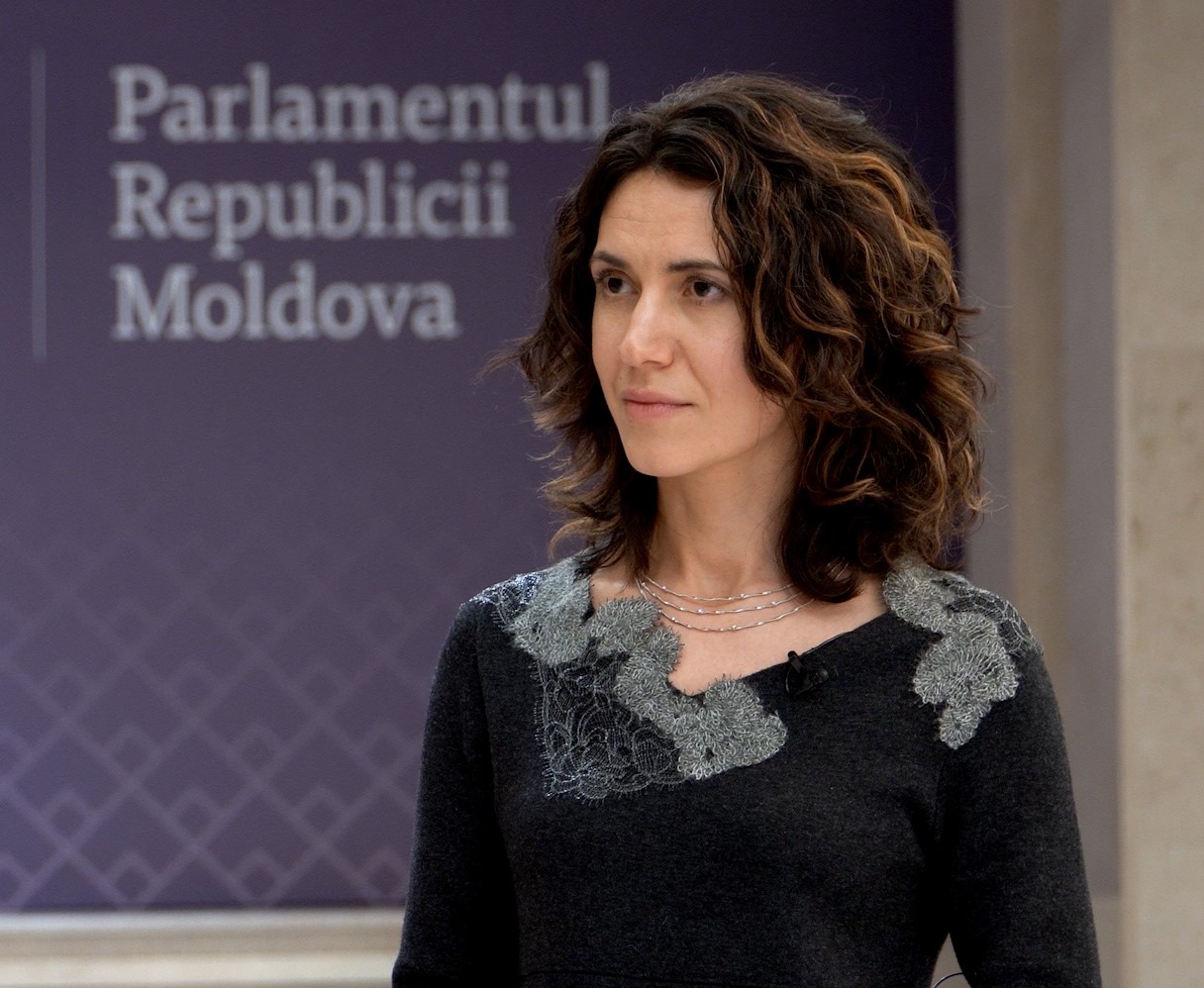
"The external candidates were proposed by the development partners, the countries that have very good expertise in justice reforms. We checked their professional career. I had no way to know reprehensible details from the career past of some candidates", said the deputy.
"In the case of some candidates, certain information reached the commission, some, after verification, did not come true, and in the case of others, which I was able to verify, the candidate in question was not selected. In the case of Herman von Hebel there was no information to reveal any particular problems of reputation and integrity. It was only when he was already in office that the Commission received information about certain problems related to his activity in a Pre-vetting Commission in Albania, but it was already too late," said Olesea Stamate.
Note: Deputy Olesea Stamate explains the case on the day of publication of the investigation, which we reproduce in full:
"The information presented in the investigation was not known to the committee at the stage of selecting the members of the Pre-vetting Commission. If it had been known to the committee, we would have asked clarifying questions to the candidate, during the interview, to assess the extent to which the information may damage the impeccable reputation required of the candidates. This is exactly what the commission did in the case of another candidate, about whom certain foreign sources allegedly wrote information that turned out to be derogatory and not at all credible. The candidate provided all the necessary explanations during the interview, respectively the committee members had no doubts about her integrity or reputation. With reference to Mr. Von Hebel's contract in Albania, the information that the Commission received (from unofficial sources), after his selection, did not reveal anything that could raise doubts about his integrity. If we had that information at the interview stage, we would have asked him during the interview, so that he could provide some clarifications, and the commission members could assess whether or not it is relevant to the selection process"
Anti-corruption expert Cristina Ciubotaru: "The consequence of the absence of an impeccable reputation and the existence of undeclared and unsettled incompatibilities is the termination of the mandate of the Pre-vetting Commission member"
We asked the expert in justice and anti-corruption, lawyer Cristina Ciubotaru, to comment on the information about possible integrity problems of Herman von Hebel, found by anticoruptie.md during the documentation process. Here's how the expert commented: "Article 5 paragraph (8) of Law 26/2022 which established the pre-vetting claims the members of the Evaluation Commission to meet certain requirements, including impeccable reputation. Unlike the candidates for the position of member in the CSM and CSP that they evaluate, with regard to the members of the Pre-vetting Commission, there is no procedure for verifying the requirement of having an impeccable reputation. But this does not mean that people who do not enjoy an impeccable reputation can work for the Commission".
Regarding the president of the Pre-Vetting Commission who is currently a judge at the Court of Appeal in Den Bosch, the Netherlands, the expert said: "The fact that Herman von Hebel was a judge in the Netherlands at the time he was appointed a member of the Pre-Vetting Commission and continues to act in this public office to this day is a problem. According to Article 5 paragraph (9) of the law, membership in the Pre-vetting Commission is incompatible with any public office. Situations of incompatibility of Commission members must be settled within 10 days from the date of their occurrence. The members of the Commission were appointed by the Parliament on 4 April 2022, which means that Herman von Hebel was to cease his other activities in the public offices held until 14 April 2022, by resigning from the position incompatible with that of a member of the Pre-vetting Commission or by suspending him from that position. The confirmation of his current activity as a judge by the Dutch court is proof of the fact that for two years, he has served as member and president of the Pre-vetting Commission in a situation of incompatibility. The law also states in article 4 paragraph (2) that in its activity, the Commission shall respect the Constitution and legislation of the Republic of Moldova".

What should happen next, I asked Cristina Ciubotaru. "The only consequence provided by Article 5, paragraph 10, of Law 26/2022 of the absence of an irreproachable reputation and the existence of undeclared and unresolved incompatibility states is the termination of the mandate of the Pre-vetting Commission member. For this case, par. 11 imperatively establishes the withdrawal of membership by the other members of the Commission, voted at a meeting in which the concerned member cannot participate, and sending the decision to the Parliament of the Republic of Moldova. By the way, there is no indication that such a meeting should be closed to the public and in the spirit of Commission transparency, such a meeting should be open so we can all watch the vote to see if the other members take a corporatist stand in solidarity with the "rotten apple" of the Commission. But above all, it is important to be able to follow the discussions about how the members of the Commission understand how to apply the standards of ethics and integrity to itself, after two years of imposing the most incredible rigors on the candidates it evaluated. It is regrettable that the leadership of the Pre-vetting Commission for 2 years was in the hands of a person who defied the norms of ethics and integrity imposed by the Law of the Republic of Moldova to be part of an important commission for justice reform, and this compromises the entire process, calling into question the legitimacy of its conduct". "How can a person who does not respect the law and whose integrity is in doubt appreciate the ethical and financial integrity of a judge, prosecutor or member of civil society? But above all, how was he able to organize and lead the toughest process of verifying the integrity of the judiciary and the prosecutor's office?!", wonders expert Cristina Ciubotaru.
At the Pre-Vetting Commission, apart from Herman van Hebel (Netherlands), at the proposal of the development partners, the Parliament of the Republic of Moldova appointed Victoria Henley (USA), Nona Tsotsoria (Georgia) and three representatives from the Republic of Moldova.
Two of the members proposed by the PAS faction were from civil society, from the public association Legal Resources Center of Moldova (CRJM) - Nadejda Hriptievschi, founding member, worked as program director at CRJM and member of the Advisory Committee Independent Anticorruption, established under the President of the Republic of Moldova in 2021. Tatiana Răducanu, former judge, acted as president of the Administrative Council of CRJM. She was appointed by presidential decree and a member of the Supreme Security Council.
Another member who was appointed by the Parliament to the Pre-Vetting Commission was proposed by the PSRM faction, Vitalie Miron, Legal Advisor in the Office of the General Mayor of Chisinau.
Resignations and suspicions of corruption
On October 6, 2023, Vitalie Miron announced his resignation from the Commission, in connection with the admission of the appeals of 21 candidates who did not pass the evaluation, and need to be reevaluated. He opined that the members of the Evaluation Commission would be forced to execute the decisions of the SCJ and to promote previously unqualified candidates, because taking another decision would mean violating the provisions of art. 120 of the Constitution of the Republic of Moldova by not executing the decisions of the SCJ. Vitalie Miron cited that a serious circumstance that he learned from the media was that the Commission promoted people who were under criminal investigation, or who had financial obligations, circumstances hidden by the candidates. Vitalie Miron also commented that "the legal mechanism did not give the Commission the opportunity to objectively and multifacetedly assess all the candidates. In fact, the members of the Commission limited themselves to the sincerity of the candidates and the bodies and institutions that provided them with the information, which proved to be in bad faith in some cases, for which fact they were to be disqualified", said Miron. Vitalie Miron is currently the only member of the Pre-Vetting Commission who had separate opinions regarding the Commission's decisions regarding magistrates Alexei Paniș, Marina Rusu, Ion Chirtoacă and Angela Bostan. He considered that they were going to promote the evaluation.
The Parliament of the Republic of Moldova appointed the members of the Pre-Vetting Commission to their positions on April 4, 2022. Currently, they are carrying out the re-evaluation procedure of the candidates for the position of member within the Superior Council of the Magistracy and the Superior Council of Prosecutors, following the cancellation by the Supreme Court of Justice of 22 decisions not to promote candidates. So far, the Commission has decided to promote only one candidate from those who did not initially pass the evaluation – magistrate Aliona Miron from the Supreme Court of Justice.
Two of the candidates who passed the pre-vetting and were appointed to the CSM and CSP resigned shortly after their appointment due to suspicions of curruption: Iulian Muntean, the candidate proposed by the Parliament in the CSM resigned exactly 1 month later from the CSM, when it was found out that he and his wife had been involved for 5 years in a large-scale corruption case orchestrated by the CNA, which the Commission did not detect by "forgetting" to call the Anti-Corruption Prosecutor's Office. Olesea Vârlan is a prosecutor, who scored the lowest number of votes at the General Assembly of Prosecutors and who resigned 3 months later after her appointment to the CSP, when it was found out that she tried to manipulate the results of the contest for the election of the prosecutor general. The Anticorruption Prosecutor's Office took act of both cases and started criminal trials.
Prime Minister Dorin Recean has accused of corruption several times this year, the Supreme Court judges, who dismissed the decisions of the Pre-Vetting Commission.
Chairman of the Pre-Vetting Commission goes silent
The anticorruptie.md portal asked several questions to the president of the Pre-Vetting Commission, Herman von Hebel. The questions were sent to the email of the secretariat and the media service on March 18, but we did not get any reply until the day of publication of the investigation. Anticoruptie.md will follow up the topic and will give the right of reply to the persons targeted in this investigation.
Investigations in the same category:
The stories from www.anticoruptie.md may be used in the limit of up to 1,000 characters. Web pages must indicate the source and link directly to the article. Print media, Radio and TV stations must indicate the source. Publishing full version of stories is allowed based on a prior agreement with the Center for Investigative Journalism. Articles published on www.anticoruptie.md are protected by the Law on copyright and related rights of Republic of Moldova.
Comments
